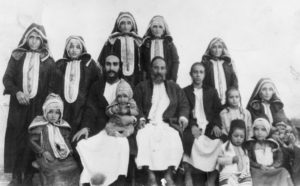 One local Yemenite Jewish tradition dates the earliest settlement of Jews in the Arabian Peninsula to the time of King Solomon. Another places Jewish craftsmen in the region as requested by Bilqis, the Queen of Saba (Sheba). A more likely explanation is the spice trade: Yemen was a key point on the ancient trade route that brought spices and perfumes from India to Yemen and from there to Greater Syria through the Hijaz from the third century BC to the third century CE. Jewish merchants played an important part in this trade.
One local Yemenite Jewish tradition dates the earliest settlement of Jews in the Arabian Peninsula to the time of King Solomon. Another places Jewish craftsmen in the region as requested by Bilqis, the Queen of Saba (Sheba). A more likely explanation is the spice trade: Yemen was a key point on the ancient trade route that brought spices and perfumes from India to Yemen and from there to Greater Syria through the Hijaz from the third century BC to the third century CE. Jewish merchants played an important part in this trade.
The Jews of Yemen enjoyed prosperity until the sixth century. The Himyarite King, Abu-Karib Asad Toban converted to Judaism at the end of the 5th century, while laying siege to Medina.
In 518 the kingdom was taken over by Zar’a Yusuf. He too converted to Judaism, and prosecuted wars to drive the Aksumite Ethiopians from Arabia. Zar’a Yusuf is chiefly known in history by his cognomen Dhu Nuwas, in reference to his “curly hair.” Jewish rule lasted until 525 CE.
 Islam came to Yemen and Jews were assured freedom of religion only in exchange for the jizya, payment of a poll tax imposed on all non-Muslims. Active Muslim persecution of the Jews did not occur until early in the 10th century.
Islam came to Yemen and Jews were assured freedom of religion only in exchange for the jizya, payment of a poll tax imposed on all non-Muslims. Active Muslim persecution of the Jews did not occur until early in the 10th century.
The Jews of Yemen worked at silver-smithing, blacksmithing, repairing weapons and tools, weaving, pottery, masonry, carpentry, shoe making, and tailoring.
The Yemenite Jewish community always maintained ties to the Land of Israel. At the time of the establishment of the State of Israel, there were over 50,000 Jews in Yemen.
 Following World War I, life for the Jews became intolerable. In 1947, following the United Nations vote to partition Palestine, the situation of the Jews in Yemen were physically in danger. Arab rioters killed 82 Jews and torched the Jewish quarter.
Following World War I, life for the Jews became intolerable. In 1947, following the United Nations vote to partition Palestine, the situation of the Jews in Yemen were physically in danger. Arab rioters killed 82 Jews and torched the Jewish quarter.
As the War of Independence ended in early 1949, Israel was devastated and virtually bankrupt. David Ben-Gurion, defying logic and the advice of his economic advisers, ordered the immediate and rapid collection of the Yemenite Jews. The majority of Jews in Yemen immigrated to Israel through Operation Magic Carpet in 1949 and 1950. American and British transport planes made about 380 trips to Aden to pick them up.
Nineteen Jews remaining in Yemen were brought to Israel in 2016. There are around 40-50 remaining, who decided that they wished to stay. Most of them live in the capital, Sana’a, near the U.S. embassy compound and the rest of live Raydah.